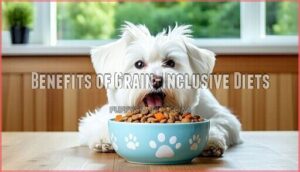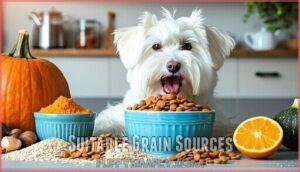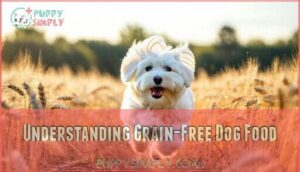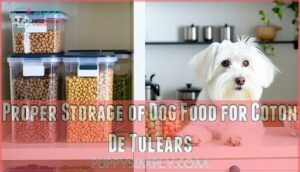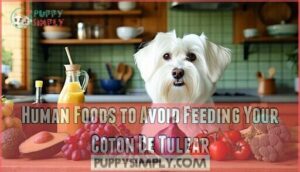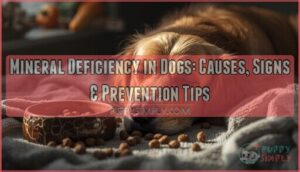This site is supported by our readers. We may earn a commission, at no cost to you, if you purchase through links.

Your fluffy companion thrives on natural ingredients with balanced omega fatty acids for their silky coat.
Avoid foods with excessive fillers or artificial preservatives.
Premium brands like Yumwoof Natural Pet Food use low-temperature cooking methods that preserve nutrients while remaining gentle on sensitive stomachs.
Since cotons typically weigh 8-15 pounds, portion control matters tremendously.
The right food transforms your pup from good to absolutely radiant, but timing shifts and understanding their unique nutritional needs makes all the difference.
Table Of Contents
- Key Takeaways
- Buyer’s Guide – Key Features to Consider
- Factors to Consider When Choosing Adult Dog Food
- Coton De Tulear Feeding Guide: How Much to Feed
- Transitioning Your Coton De Tulear Puppy to Adult Food
- Understanding Grain-Inclusive Dog Food
- Understanding Grain-Free Dog Food
- Proper Storage of Dog Food for Coton De Tulears
- Managing Weight in Coton De Tulears
- Human Foods to Avoid Feeding Your Coton De Tulear
- Frequently Asked Questions (FAQs)
- What is the best dog food for my Coton de Tulear?
- What do Coton de Tulear eat?
- Are Coton de Tulear a good dog breed?
- What should Coton de Tulear eat?
- What are the downsides of Coton de Tulear?
- Do Coton de Tulears have sensitive stomachs?
- What is the #1 healthiest dog food?
- How often should I feed my Coton De Tulear?
- Are food allergies common in this breed?
- When should I switch to senior dog food?
- Conclusion
Key Takeaways
- You’ll want to prioritize high-quality protein as the first ingredient in your coton de tulear’s dog food, with minimal fillers and artificial additives, to support their overall health and wellbeing.
- Choosing the right kibble size is crucial for your coton de tulear’s small mouth and digestive system, so opt for smaller kibble sizes that promote good dental hygiene and easy digestion.
- It’s essential to monitor your coton de tulear’s weight and adjust their food portions accordingly, as they can easily gain weight and put excess stress on their joints, leading to potential health issues.
- You should avoid feeding your coton de tulear certain human foods that can be harmful to their health, such as chocolate, nuts, and milk, and instead opt for safe fruits and vegetables like apples, bananas, and carrots, in moderation and with proper preparation.
Buyer’s Guide – Key Features to Consider
When selecting the best food for your Coton de Tulear, you’ll need to focus on four essential features that directly impact their health and wellbeing.
Choose the right food for a healthy Coton de Tulear life
These key considerations will help you navigate the countless options and find a formula that meets your dog’s specific nutritional needs.
Protein Content
When choosing dog food for your Coton de Tulear, prioritize protein sources like lean meats, such as deboned chicken or salmon.
Avoid by-products and plant proteins, which can be allergenic. The right balance of proteins from high-quality sources helps maintain muscle mass and supports immune system health.
As a Coton de Tulear owner, you want to make certain your dog gets the right amount of protein, whether it’s puppy protein for growth or senior protein for maintenance. Look for meat-based proteins, and be aware of protein allergies.
Lean proteins are essential for muscle maintenance, making them a vital component of your dog’s diet. Many owners specifically seek lean protein options for their pets.
Carbohydrate Sources
When selecting dog food for your coton de tulear, consider complex carbs like sweet potatoes, which provide sustained energy.
Avoid simple sugars and opt for grain-free dog food with low glycemic index. Fiber content is also key, as it helps with digestion.
Be aware of carb allergies and choose dog food with wholesome ingredients. Sweet potatoes are a great source of fiber and can be a good addition to a coton de tulear diet.
For healthy health, consider low glycemic options. Look for dog food with balanced carbohydrates to guarantee your pet stays healthy and happy. Balance is key in their diet.
Healthy Fats
When evaluating dog food for your coton de tulear, consider these key fat sources:
- Fish oil
- Flaxseed
- Chicken fat
- Omega-3 fatty acids
- Coconut oil
These healthy fats support skin health, brain function, and joint support. Look for small breed food with ideal nutrition, including a balanced omega balance, to keep your coton de tulear thriving.
A diet rich in healthy fats will promote shiny coats and overall well-being, making it an essential aspect of their diet. Animal fats are digestible and rich in essential fatty acids.
Choose a dog food with high-quality fat sources for superior nutrition.
Size of Kibble
As you consider your Coton de Tulear’s diet, remember smaller kibble sizes offer benefits, including easier chewing and digestion.
This is especially important for small breeds like the Coton de Tulear, promoting good dental hygiene.
Breed-specific kibble sizes, such as those for puppies or seniors, can also support overall health, making mealtime more enjoyable and nutritious for your small breed dog, which is crucial for their overall health.
Factors to Consider When Choosing Adult Dog Food
When choosing adult dog food for your Coton De Tulear, you’ll want to evaluate key factors that guarantee their nutritional needs are met.
You should look for dog food with AAFCO certification, animal protein as the first ingredient, and added vitamins and minerals to support their overall health.
AAFCO Certification
You’re looking for a dog food that meets your Coton de Tulear’s nutritional requirements.
Now, let’s talk about AAFCO certification, which guarantees nutritional adequacy. AAFCO sets standards for pet foods, including testing protocols and ingredient compliance.
When verifying a dog food’s label, check for AAFCO standards to confirm it meets your small breed’s needs. This verification guarantees your Coton de Tulear gets the necessary nutrients, giving you peace of mind about their diet and health.
AAFCO certification is a key factor in choosing the right dog food.
Animal Protein as The First Ingredient
When choosing the best dog food for your Coton de Tulear, make certain the first ingredient is a meat-based protein source, like chicken or salmon.
This protein source provides essential amino acids for muscle development and serves as a key energy source, enhancing protein digestibility and overall protein quality.
Added Vitamins and Minerals
When selecting dog food for your Coton de Tulear, make certain it includes added vitamins and minerals for ideal nutrition.
Vitamin E supports skin health, while calcium promotes strong bones.
Look for chelated minerals, which are easier to absorb.
Supplement types, such as vitamin and mineral sources, can help prevent deficiency signs.
Essential levels of these micronutrients are vital for your Coton de Tulear’s overall well-being, supporting healthy growth and energy levels, and helping to prevent common health issues in this breed.
Coton De Tulear Feeding Guide: How Much to Feed
You’ll need to determine the right amount of food for your Coton De Tulear, considering factors like age, weight, and activity level.
Finding the perfect portion size for your Coton De Tulear ensures optimal health and happiness.
By calculating daily caloric needs and monitoring your dog’s body condition score, you can confirm they’re getting the nutrients they need to thrive.
Calculating Daily Caloric Needs
Your Coton de Tulear’s calorie requirements depend on several key factors that work together like pieces of a puzzle.
Age factors play a significant role—puppies need more calories for growth, while seniors typically require fewer due to slower metabolism. Activity level directly impacts daily needs, with active dogs requiring 20-30% more calories than couch potatoes.
Weight goals matter too; overweight Cotons need restricted intake for proper weight management. Adult Cotons typically need 860-1,290 calories daily, though your specific pup might fall outside this range.
Considering that the breed is prone to luxating patellas, it’s vital to make certain their diet supports optimal joint health. Getting veterinary input guarantees you’re hitting the sweet spot for your furry friend’s unique needs.
Monitoring Body Condition Score
After calculating daily calories, you’ll need to monitor your Coton de Tulear’s body condition score to guarantee proper weight management.
This hands-on assessment helps you adjust their dog food portions based on what you see and feel, not just numbers on a scale.
Visual assessment and palpation techniques work together to give you the full picture of your dog’s health:
- Feel for ribs – You should easily feel them without pressing hard, but they shouldn’t be visible
- Check the waist tuck – Your Coton should have a visible waist when viewed from above
- Use a BCS chart – Compare your dog’s body shape to standardized scoring guides
- Track weight fluctuation – Small changes are normal, but consistent trends need adjusting diet
Weight management food becomes necessary if your Coton scores above ideal on the BCS chart.
Maintaining an ideal weight involves understanding optimal dog condition.
Transitioning Your Coton De Tulear Puppy to Adult Food
Switching your Coton de Tulear from puppy to adult food requires careful timing and patience.
You’ll need to make this switch gradually around their first birthday to avoid digestive upset and guarantee they receive proper nutrition for their adult years.
Ideal Age for Transition
The sweet spot for switching your Coton de Tulear from puppy food to adult food arrives around 12 months of age.
While smaller breeds like Cotons mature faster than large breeds, waiting until their first birthday guarantees their Growth Stage Diets have supported complete skeletal development and stabilized metabolic needs.
Your puppy’s Breed-Specific Needs change dramatically during this Puppy to Adult shift period.
Coton de Tulears require less protein and calories as adults compared to their energetic puppy days, making this Timeline vital for preventing weight gain that could stress their delicate joints.
Watch for signs your Coton’s ready: they’ve reached their expected adult weight, their eating habits have settled, and their energy levels have evened out.
Starting the Adult to Senior shift won’t happen for several years, so you’ll have plenty of time to perfect this current switch.
Remember, rushing this process can upset their sensitive digestive systems and potentially impact their long-term health.
Gradual Transition Process
When switching your Coton de Tulear to adult food, mix small amounts of new food with their current diet, increasing it over 7-10 days.
Monitor stool and watch for digestive issues. Adjust the mixing ratios based on palatability concerns and your dog’s sensitive stomach, ensuring a smooth switch timeline to prevent digestive upset.
Understanding Grain-Inclusive Dog Food
You’re considering grain-inclusive dog food for your Coton De Tulear, which can be a great option if you choose the right ingredients.
As you explore grain-inclusive diets, you’ll want to focus on whole grains like brown rice, oats, and barley, which provide essential nutrients and fiber for your dog’s overall health.
Benefits of Grain-Inclusive Diets
Once your Coton de Tulear is an adult, you can explore different food options.
Grain-inclusive diets can be a great way to provide balanced nutrition. They offer variety, letting your small breed dog experience different flavors and textures. You’ll find they’re often formulated with quality ingredients.
- Sustainable Energy
- Digestive Health
- Nutrient Density
- Cost Effectiveness
These diets provide essential nutrients, like vitamins and fiber. It’s important to remember that grains offer benefits like carbohydrates and antioxidants.
They also spark debate about species-appropriate nutrition. Grain inclusions may offer benefits if monitored. Providing dietary diversity helps guarantee your Coton de Tulear’s overall health.
Suitable Grain Sources
When selecting grain-inclusive dog food for your Coton de Tulear, consider these suitable grain sources:
- Whole grains like oats and brown rice
- Homemade options like pumpkin puree
- Quinoa for its nutrient density
These grains offer digestibility factors, low allergy potential, and a suitable glycemic index.
As a small breed owner, you want the best for your pet, so choose grainfree dog food or Superior Care White Dogs, considering processing methods and nutrient density to guarantee a healthy diet for your Coton de Tulear.
Understanding Grain-Free Dog Food
You’re considering grain-free dog food for your Coton De Tulear, and this is a key factor to consider.
As you explore this option, you’ll learn about alternative carbohydrate sources and how they can impact your dog’s health.
Pros and Cons of Grain-Free Diets
Grain-free dog food offers both benefits and drawbacks for your Coton de Tulear.
On the positive side, these diets can improve digestion concerns and may help dogs with allergies to grains, though true grain allergies affect less than 1% of dogs.
However, studies link grain-free formulas containing legumes to heart issues in some breeds.
The pros include potentially shinier coats and better digestibility, while cons involve possible nutritional gaps and higher costs.
Always consult your vet before switching to guarantee nutritional completeness for your Coton’s specific needs, considering the potential nutritional gaps.
Alternative Carbohydrate Sources
When choosing grain-free dog food for your Coton de Tulear, you’ll discover several carbohydrate alternatives that provide essential nutrients without traditional grains.
These novel starches offer unique benefits while addressing specific dietary needs.
Consider these alternative carbohydrate sources for your Coton de Tulear:
- Sweet potatoes – Rich in beta-carotene and fiber, supporting digestive health
- Tapioca – Highly digestible starch with hypoallergenic properties
- Ancient grains like quinoa – Provide complete amino acid profiles
- Brown rice – Gentle on sensitive stomachs while offering sustained energy
- Legumes – Beans and peas add protein but may cause digestive concerns
These alternatives help maintain stable blood sugar levels while providing the energy your Coton needs for daily activities.
Proper Storage of Dog Food for Coton De Tulears
Proper dog food storage keeps your Coton de Tulear healthy and prevents costly waste from spoiled kibble.
You’ll need different approaches for dry and wet food, plus knowledge of spoilage warning signs.
Storing Dry Dog Food
To keep your Coton de Tulear’s dry dog food fresh, store it in airtight containers, maintaining temperature control and preventing pest invasion, which helps extend shelf life and preserve dog food quality.
This helps ensure your pet’s nutritional needs are met.
Consider using stackable containers for efficient space use.
Storing Wet Dog Food
When storing wet dog food for your Coton de Tulear, always check the Refrigeration Duration and Freezing Options.
For Opened vs. Unopened containers, follow Safe Thawing guidelines to prevent Spoilage Signs.
Proper storage is key to maintaining your dog’s health, so be sure to follow these dog food tips for wet dog food storage, considering Safe Thawing guidelines.
Signs of Rancid Food
You’re storing your Coton De Tulear’s dog food, and now it’s time to check for signs of rancidity.
Be on the lookout for:
- Offensive Odor
- Discoloration Changes
- Mold Growth
- Pest Infestation
- Texture Alteration
If you notice any of these, it’s time to discard the food.
Remember, fresh dog food is key to your dog’s health, and spoiled food can lead to food sensitivities or allergies.
Check the food regularly to confirm it remains safe and healthy for your pet.
Managing Weight in Coton De Tulears
You’ll want to monitor your Coton De Tulear’s weight closely, as they can easily gain weight, putting excess stress on their joints.
By managing their weight through a balanced diet and regular exercise, you can help prevent health issues and guarantee your dog leads a happy, healthy life.
Identifying Overweight Coton De Tulears
As you monitor your Coton de Tulear’s weight, consider factors like Body Condition Score and Rib Palpability.
This helps identify obesity early, ensuring a healthy weight for your pet, by considering factors such as Weight Gain Causes.
| Weight Gain Causes | Prevention |
|---|---|
| Overeating | Measure calorie count |
| Low Activity Level | Increase exercise |
| Poor Diet | Choose healthy food |
| Genetics | Regular veterinary checkups |
| Age | Monitor weight regularly |
Regular monitoring and prevention strategies, including Regular veterinary checkups, can help maintain a healthy weight for your pet.
Dietary Strategies for Weight Management
As a Coton de Tulear owner, you play a vital role in weight management. Implement these strategies:
- Portion control
- Exercise integration
- Calorie restriction
- Supplement support.
Regular weigh-ins will help track progress. For small breeds like Coton de Tulear, obesity is a significant concern.
A key step involves selecting puppy food carefully. By monitoring calorie count and maintaining a healthy diet, you can prevent weight-related issues.
Combine a balanced diet with exercise and regular check-ups for effective weight management, ensuring your Coton de Tulear leads a happy, healthy life.
Human Foods to Avoid Feeding Your Coton De Tulear
You’ll want to avoid feeding your Coton De Tulear certain human foods that can be harmful to their health.
As you learn what to feed your dog, it’s also important to know what foods to avoid, so you can keep them safe and healthy.
Harmful Foods
Your Coton De Tulear’s diet requires careful consideration to avoid harmful foods.
Toxic ingredients like chocolate, nuts, and milk can be poisonous.
Allergy triggers, such as tryptamine in chocolate, can cause severe reactions.
Processed foods with unhealthy additives should also be avoided.
Portion control is vital to prevent long-term effects from consuming harmful substances.
Be aware of common allergy triggers and poisonous foods to safeguard your dog’s safety.
Some human foods can have devastating consequences if ingested, including grapes, onions, and macadamia nuts, which can lead to serious health issues.
Some cooked carrots are safe for dogs, offering beneficial nutrients.
Safe Fruits and Vegetables
Many safe fruits and vegetables can supplement your Coton de Tulear’s dog food.
Apples, bananas, and carrots are healthy options, fresh or cooked.
Strawberries and blueberries make great homemade treats.
However, beware of toxic produce like grapes and onions.
Prepare snacks like pumpkin or zucchini slices for essential vitamins and minerals.
When introducing new foods, consult with a vet to guarantee your dog’s safety.
Serve safe fruits and vegetables in moderation, using proper preparation methods and suitable serving sizes to support your Coton de Tulear’s overall dog health and well-being.
Frequently Asked Questions (FAQs)
What is the best dog food for my Coton de Tulear?
Like choosing the perfect key for an intricate lock, selecting your Coton’s food requires precision.
You’ll want high-quality protein (18%), minimal fat (5%), and brands like Taste of the Wild or Merrick Lil’ Plates, which cater to small breeds’ unique nutritional needs.
What do Coton de Tulear eat?
Your Coton de Tulear needs high-quality protein as the first ingredient, ideally 18% protein content with 5% fat. They’ll thrive on chicken, fish, or lamb-based foods with minimal fillers and artificial additives.
Are Coton de Tulear a good dog breed?
If you want a cheerful companion, this breed’s tough to beat—small, sturdy, and smart, they rarely shed and crave family time.
You’ll love their happy-go-lucky ways, but be ready: daily brushing is a must!
What should Coton de Tulear eat?
Well, they’re not exactly thriving on pizza crusts.
You’ll want to stick with high-quality, meat-based dog food—preferably with around 18% protein, low fillers, and essential joint supplements.
Portion control matters, or those little knees suffer from low quality food.
What are the downsides of Coton de Tulear?
You’ll encounter downsides like luxating patellas, hip dysplasia, and eye issues, which require careful monitoring and potentially costly veterinary care to guarantee your Coton de Tulear’s health.
Do Coton de Tulears have sensitive stomachs?
You’ll find that Coton de Tulears can be prone to sensitive stomachs.
So monitoring their diet and watching for signs of discomfort is essential for their overall health and well-being always.
What is the #1 healthiest dog food?
You’ll discover Nom Nom is the #1 healthiest dog food, offering fresh, human-grade, customizable meals for superior nutrition and digestion, making it a top choice for pet owners seeking quality.
How often should I feed my Coton De Tulear?
You should feed your Coton De Tulear 2-3 times daily, adjusting portions based on age, weight, and activity level to maintain a healthy weight and prevent obesity.
Are food allergies common in this breed?
Don’t worry, you’re not alone in wondering; food allergies can cause dry, itchy skin in your Coton De Tulear, so monitoring their diet is essential to prevent discomfort.
When should I switch to senior dog food?
You’ll typically switch to senior dog food around 8-9 years old, depending on your Coton de Tulear’s health, weight, and activity level, to support joint and mobility needs.
Conclusion
Ultimately, you’re left wondering, what’s the key to discovering your coton de tulear’s full potential?
It starts with finding the best dog food for coton de tulears, prioritizing high-quality ingredients, and a balanced diet, you’ll be well on your way to raising a happy, healthy companion.
So choose the best dog food for coton de tulears wisely.
- https://www.petmd.com/dog/breeds/coton-de-tulear
- https://www.prodograw.com/raw-feeding-guide/coton-de-tulear-feeding-guide/
- https://scrumbles.co.uk/blogs/dog/coton-de-tulear-breed-guide
- https://yumwoof.com/pages/pet-stores-by-breed-coton-de-tulear
- https://www.reddit.com/r/cotondetulear/comments/1b3tauw/best_diet_for_a_coton/





